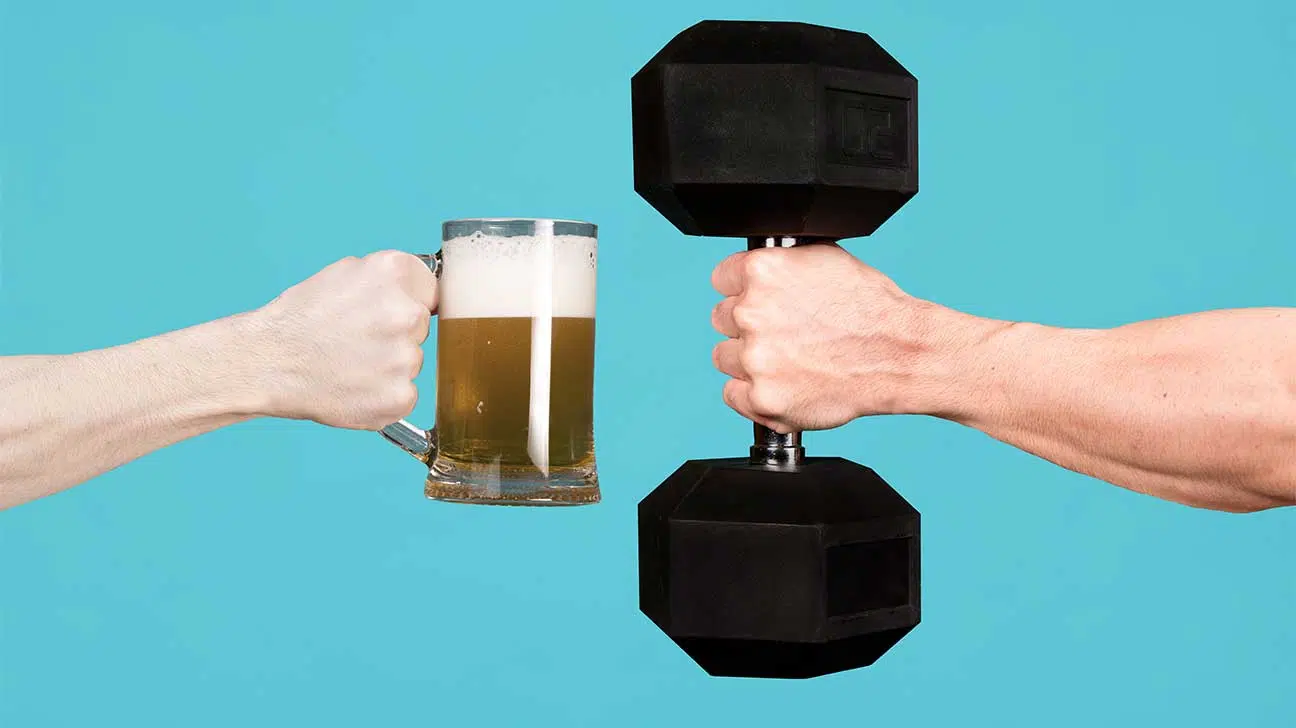
Scientists do not know everything about the relationship between alcohol tolerance and exercise, so you may wonder, does alcohol tolerance increase or decrease with exercise?
In fact, exercise can increase your tolerance for the effects of alcohol, but it does not make you immune to the dangers of alcohol.
For example, heavy drinkers who exercise can still have high blood pressure. And the quality of your athletic performance can decrease according to the amount of alcohol you consume.
So, if you believe that exercising means you can drink more, here are the reasons why that’s not true.
How Exercise Improves Alcohol Tolerance
There are a couple of key results of exercising that create a higher tolerance to alcohol’s effects. These results are, in fact, the main reasons why people start exercising in the first place.
Muscle Mass And Body Fat
Muscle mass and body fat are two classic motivations for exercise.
The more you work out:
- the more your muscle mass increases
- the more your body mass decreases
As it happens, this is the perfect combination for alcohol tolerance.
Once alcohol is digested, it tours your body through the bloodstream and enters into tissues such as muscle. But alcohol doesn’t like fat or bone.
The more fat you have, the more alcohol is pushed into your muscle tissue. By contrast, the more muscle mass you have, the more tissue alcohol has to penetrate for you to feel its effects.
By decreasing your body fat and increasing your muscle mass through exercise, it can take longer for you to feel the effects of drinking alcoholic beverages.
Protein Synthesis
Protein synthesis describes how your body makes proteins. Exercise is famous for increasing protein synthesis, especially when connected to the right diet, and it is the key way in which exercise builds muscle mass.
As you increase physical activity and your muscle mass, your tolerance for alcohol increases as well.
Effects Of Alcohol Consumption On Athletic Performance
But tolerance for alcohol does not make you immune to intoxication, alcohol dependence, or its other effects.
Here are some ways drinking alcohol can affect your fitness regimen and overall performance.
Poor Reaction Time
Alcohol can affect motor control and reaction time when you are drinking. This is commonly known.
But over time, heavy drinking causes these functions to weaken even the next day after drinking.
Reduced Muscle-Building
Heavy drinking will eventually impair your body’s ability for protein synthesis.
Studies have shown that alcohol consumption after a workout, even when taken with protein, hampers protein synthesis that your body relies on for muscle building.
Treatment Programs For Alcohol Use Disorder
Physical activity is good for you but it does not give you the ability to avoid alcohol use disorder. In fact, it may function as an excuse to drink more.
But alcohol treatment is available, including programs that offer alcohol detox, recovery resources, and support groups.
Find A Drug And Alcohol Rehab Facility Today
At AddictionResource.net, we provide confidential help for you or your loved one. If you think you or a family member has an alcohol use disorder, we can help you find a rehab center in your area.
Call our helpline today and get started on your journey toward sobriety.
Addiction Resource aims to provide only the most current, accurate information in regards to addiction and addiction treatment, which means we only reference the most credible sources available.
These include peer-reviewed journals, government entities and academic institutions, and leaders in addiction healthcare and advocacy. Learn more about how we safeguard our content by viewing our editorial policy.
- Bowling Green State University —Factors that Affect Intoxication
https://www.bgsu.edu/recwell/wellness-connection/alcohol-education/factors-that-affect-intoxication.html - Frontiers in Psychiatry — Exercise and Alcohol Consumption: What We Know, What We Need to Know, and Why It Is Important
https://www.ncbi.nlm.nih.gov/pmc/articles/PMC4629692/ - Plos One — Alcohol Ingestion Impair Maximal Post-Exercise Rates of Myofibrillar Protein Synthesis Following a Single Bout of Concurrent Training
https://www.ncbi.nlm.nih.gov/pmc/articles/PMC3922864/


